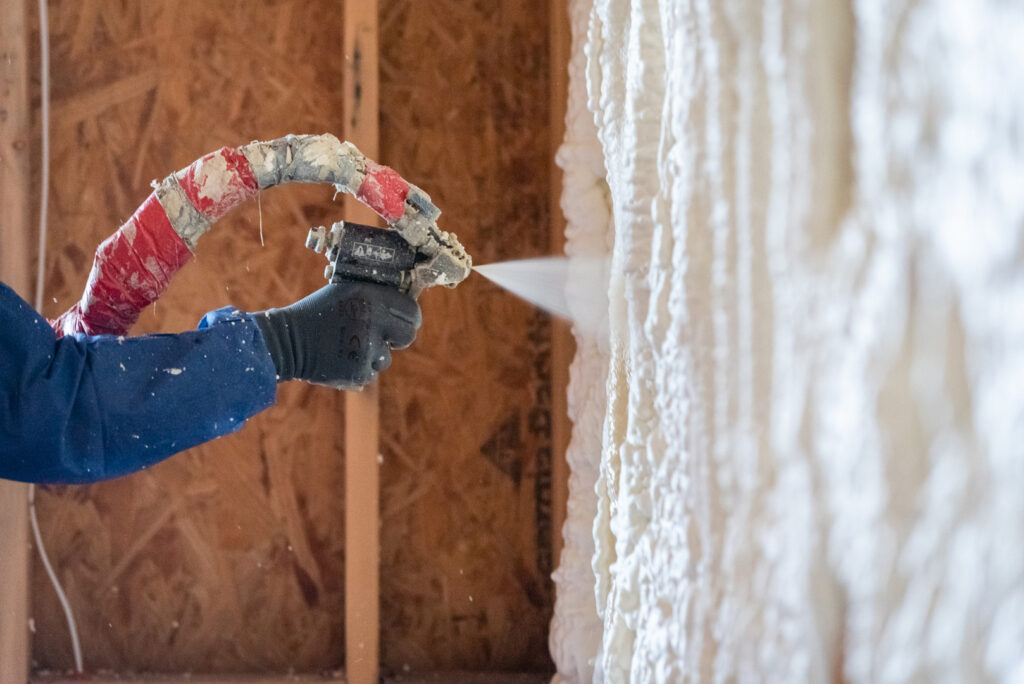Polyurethane Spray Foam Insulation In Pakistan
Polyurethane spray foam insulation is a widely utilized and very efficient insulating material employed in residential, commercial, and industrial environments. Polyurethane spray foam is selected for its exceptional thermal insulation capabilities, airtight seal, and compliance. It is renowned for its capacity to promote energy efficiency, enhance comfort, and lower utility expenses. This introduction offers a comprehensive review of polyurethane spray foam insulation, encompassing its characteristics, varieties, uses, and advantages.
Insulation is essential to keep your house cool in summer and warm in winter. By investing in proper insulation, you can reduce energy bills and create a comfortable living environment.

What is Polyurethane Spray Foam Insulation?
Polyurethane spray foam insulation is a sort of insulating material that is produced by combining two chemical components, isocyanate and polyol resin, which undergo a chemical reaction to generate a foam. Upon application, the liquid foam undergoes expansion and hardening, resulting in the formation of a seamless barrier that definitely assigns to various surfaces, effectively covering any gaps or cracks. This expanded foam possesses a prominent R-value, which is a quantitative indicator of its ability to resist heat transfer. Consequently, it serves as an exceptional insulating material.
Types of Polyurethane Spray Foam Insulation
- Open-Cell Spray Foam:
- Structure: Open-cell spray foam possesses a porous consistency and exhibits lower density compared to closed-cell foam. The cells of this foam are partially open, enabling the entry of air into the empty areas.
- R-Value: The R-value of open-cell foam typically ranges from 3.5 to 3.6 per inch of thickness.
- Applications: Open-cell foam is commonly used for interior applications such as walls, ceilings, and attics. It is effective for soundproofing and provides good insulation at a lower cost than closed-cell foam.
- Closed-Cell Spray Foam:
- Structure: Closed-cell spray foam has higher density and greater rigidity compared to open-cell foam. The cells are fully enclosed and densely packed, resulting in the foam’s exceptional insulating characteristics.
- R-Value: The R-value of closed-cell foam typically ranges from 6.0 to 7.0 per inch of thickness, making it one of the most effective insulation materials available.
- Applications: Closed-cell foam is utilized in both external and interior applications, including walls, roofing, and foundations. Its stiffness and moisture resistance make it excellent for regions prone to water exposure.
Applications of Polyurethane Spray Foam Insulation
- Residential Insulation:
- Walls and Ceilings: PU Spray foam insulation is generally used in walls and ceilings to form an effective thermal barrier, minimizing heat loss in winter and heat gain in summer.
- Attics and Crawl Spaces: Applying PU spray foam in attics and crawl spaces helps minimize air leaks and moisture infiltration, increasing overall energy efficiency and indoor air quality.
- Commercial and Industrial Insulation:
- Roof Insulation: Polyurethane Spray foam is extensively used for insulating commercial and industrial roofs, giving good thermal resistance and decreasing energy expenses.
- Cold Storage: Closed-cell Polyurethane spray foam insulation is used in cold storage facilities to maintain consistent temperatures and prevent energy loss.
- Air Sealing:
- Gap and Crack Filling: Spray foam is perfect for sealing gaps, fissures, and joints in structures, minimizing air leakage and boosting the building’s energy efficiency.
- Duct Insulation: Spray foam can be applied to ducts to prevent air loss and ensure that HVAC systems operate more efficiently.
- Moisture and Vapor Barrier:
- Waterproofing: Closed-cell spray foam is widely utilized as a moisture barrier in locations prone to water exposure, such as basements and foundations. Its water-resistant characteristics assist safeguard structures from moisture-related harm.
- Soundproofing:
- Acoustic Insulation: Open-cell spray foam has sound-dampening capabilities, making it a viable choice for decreasing noise transmission in residential and commercial structures.
Advantages of Polyurethane Spray Foam Insulation
- High Thermal Insulation: Spray foam insulation has one of the highest R-values among insulation materials, giving outstanding thermal resistance and energy efficiency.
- Air Tightness: The expanding nature of spray foam guarantees that it fills all gaps and fractures, providing an airtight barrier that avoids drafts and air leakage, which are typical in other insulation materials.
- Moisture Resistance: Closed-cell spray foam is extremely resistant against moisture, decreasing the danger of mold development and structural damage caused by water intrusion.
- Structural Support: Closed-cell foam offers stiffness and strength to walls and roofs, adding to the overall structural integrity of the structure.
- Energy Savings: By limiting heat loss and air leakage, spray foam insulation may considerably cut energy consumption, leading to substantial savings on heating and cooling expenditures.
- Long-Lasting Performance: Spray foam insulation is resilient and retains its insulating characteristics over time, offering long-term energy efficiency without the need for periodic replacement or maintenance.
- Environmental Benefits: Polyurethane Spray foam insulation helps to a building’s overall energy efficiency, decreasing its carbon impact. Some spray foam products are also available in eco-friendly formulations, created with renewable resources or lower global warming potential (GWP) blowing agents.
